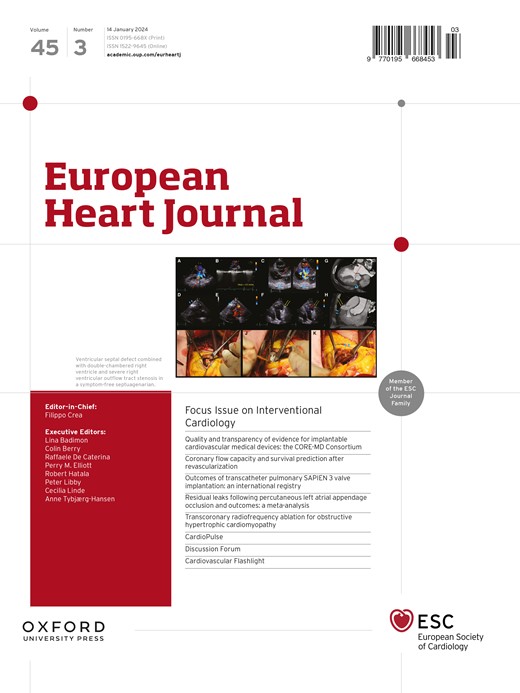癌症患者静脉血栓栓塞和出血复发的预测因素:荟萃分析
IF 35.6
1区 医学
Q1 CARDIAC & CARDIOVASCULAR SYSTEMS
引用次数: 0
摘要
背景和目的癌症和静脉血栓栓塞(VTE)患者复发静脉血栓栓塞和抗凝相关出血的风险很高。本研究旨在确定这些并发症的预后因素。方法对随机试验和队列研究进行系统回顾,评估成年癌症和静脉血栓栓塞患者复发性静脉血栓栓塞或抗凝相关出血的预后因素。采用随机效应荟萃分析合并各因素的校正风险比(aHRs)。采用建议分级、评估、发展和评价方法评估证据的确定性。结果33项研究(n = 96 753)被纳入meta分析。与静脉血栓栓塞复发风险增加相关的高确定性因素包括静脉血栓栓塞病史[aHR 1.50 (95% CI 1.08-2.09)]、东部肿瘤合作组(ECOG)的表现状态&;gt;0[1.81(1.34-2.46)]或&;gt;1[2.44(1.55-3.84)]、晚期癌症[1.38(1.15-1.65)],以及特定的癌症部位包括肺[1.78(1.29-2.46)]、肝胆[2.37(1.70-3.30)]、胰腺[3.20(2.06-4.96)]、泌尿生殖系统[1.38(1.14-1.67)]。相反,近期手术[aHR 0.56 (95% CI 0.40-0.76)]和乳腺癌[0.43(0.23-0.81)]与风险降低有很高的相关性。与抗凝血相关出血风险增加相关的高确定性因素包括出血史[aHR 2.41 (95% CI 1.50-3.88)]、ECOG性能状态≥2[2.10(1.48-2.99)]、晚期癌症[1.60(1.29-1.97)]、脑癌[2.25(1.64-3.09)]、胃肠道癌[1.74(1.44-2.11)]、泌尿生殖系统癌[1.90(1.48-2.45)]、前列腺癌[1.72(1.26-2.34)]。结论:本荟萃分析中确定的预后因素应被视为癌症和静脉血栓栓塞患者抗凝管理的风险分层框架的一部分。本文章由计算机程序翻译,如有差异,请以英文原文为准。
Predictors of recurrent venous thromboembolism and bleeding in patients with cancer: a meta-analysis
Background and Aims Patients with cancer and venous thromboembolism (VTE) have a high risk of recurrent VTE and anticoagulant-related bleeding. This study aimed to identify prognostic factors for these complications. Methods A systematic review was performed for randomized trials and cohort studies evaluating prognostic factors for recurrent VTE or anticoagulant-related bleeding in adult patients with cancer and VTE. Adjusted hazard ratios (aHRs) for factors were pooled using random-effects meta-analysis. The certainty of evidence was assessed using the Grading of Recommendations, Assessment, Development and Evaluation approach. Results Thirty-three studies (n = 96 753) were included in the meta-analyses. Factors with high certainty of association with increased risk of recurrent VTE included a previous history of VTE [aHR 1.50 (95% CI 1.08–2.09)], Eastern Cooperative Oncology Group (ECOG) performance status >0 [1.81 (1.34–2.46)] or >1 [2.44 (1.55–3.84)], advanced cancer [1.38 (1.15–1.65)], and specific cancer sites including lung [1.78 (1.29–2.46)], hepatobiliary [2.37 (1.70–3.30)], pancreas [3.20 (2.06–4.96)], and genitourinary [1.38 (1.14–1.67)]. Conversely, recent surgery [aHR 0.56 (95% CI 0.40–0.76)] and breast cancer [0.43 (0.23–0.81)] had a high certainty of association with a decreased risk. Factors with a high certainty of association with an increased risk of anticoagulant-related bleeding included a history of bleeding [aHR 2.41 (95% CI 1.50–3.88)], ECOG performance status ≥2 [2.10 (1.48–2.99)], advanced cancer [1.60 (1.29–1.97)], and cancers of the brain [2.25 (1.64–3.09)], gastrointestinal system [1.74 (1.44–2.11)], genitourinary system [1.90 (1.48–2.45)], and prostate [1.72 (1.26–2.34)]. Conclusions The prognostic factors identified in this meta-analysis should be considered as part of risk stratification frameworks for anticoagulation management in patients with cancer and VTE.
求助全文
通过发布文献求助,成功后即可免费获取论文全文。
去求助
来源期刊

European Heart Journal
医学-心血管系统
CiteScore
39.30
自引率
6.90%
发文量
3942
审稿时长
1 months
期刊介绍:
The European Heart Journal is a renowned international journal that focuses on cardiovascular medicine. It is published weekly and is the official journal of the European Society of Cardiology. This peer-reviewed journal is committed to publishing high-quality clinical and scientific material pertaining to all aspects of cardiovascular medicine. It covers a diverse range of topics including research findings, technical evaluations, and reviews. Moreover, the journal serves as a platform for the exchange of information and discussions on various aspects of cardiovascular medicine, including educational matters.
In addition to original papers on cardiovascular medicine and surgery, the European Heart Journal also presents reviews, clinical perspectives, ESC Guidelines, and editorial articles that highlight recent advancements in cardiology. Additionally, the journal actively encourages readers to share their thoughts and opinions through correspondence.
 求助内容:
求助内容: 应助结果提醒方式:
应助结果提醒方式:


